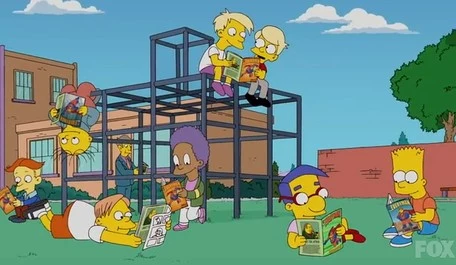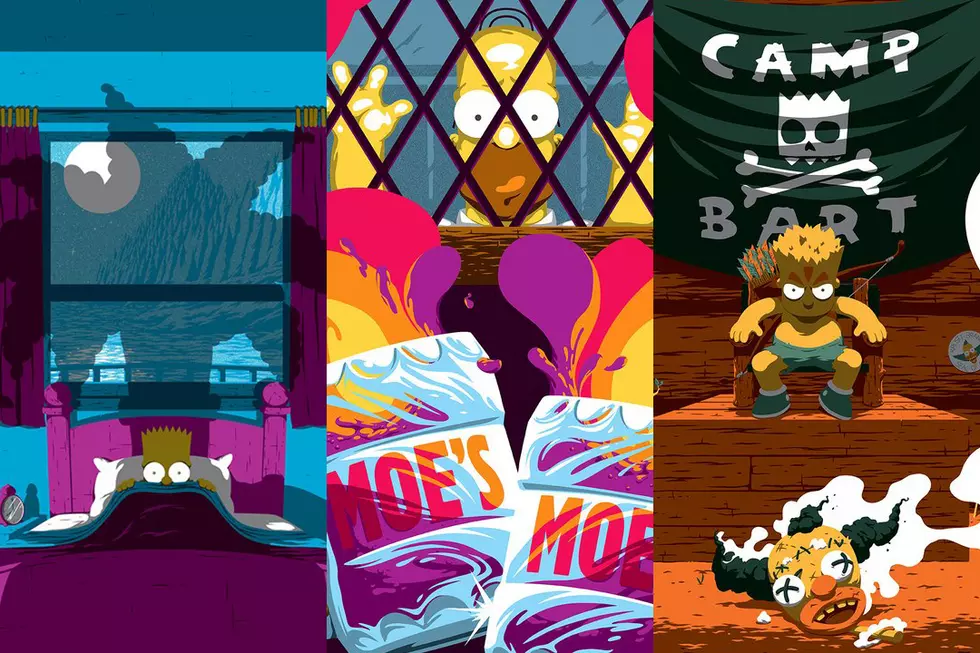
Debunking the Magical, Mythical Comics World of the ‘Simpsons’ Premiere
 "The Simpsons" has touched on the world of comics before with their fanboy caricature Comic Book Guy, and even created their own parody superhero, Radioactive Man -- who later became an movie hero in a film starring Milhouse as his sidekick Fall Out Boy, a name that later inspired a real-life pop group that would later dabble in comics, making it all a rich, circular tapestry.
"The Simpsons" has touched on the world of comics before with their fanboy caricature Comic Book Guy, and even created their own parody superhero, Radioactive Man -- who later became an movie hero in a film starring Milhouse as his sidekick Fall Out Boy, a name that later inspired a real-life pop group that would later dabble in comics, making it all a rich, circular tapestry.
In its 21st season premiere, the show went back to the comics well to take on the new wave of comic-to-movie translations, but not before Bart decided to push all of comic book guy's buttons by asking him, "I just heard that before 'Spider-Man' was a movie, it was a comic. Is that possible?" Yes, "Simpsons," you have our number.
The biggest surprise of the episode is that rather than turning towards mainstream superhero books, Comic Book Guy decides to self-publish his own "Everyman" superhero stories as independent black and white comics (which, naturally, leads to a film option). You know things are getting a little weird when the world's biggest fanboy decides to go indie -- it's a weird, uncharacteristic move for someone whose entire life is devoted to obsessing over mainstream superheroes.
He prints up his own black and white issues at his local copy shop -- and granted, it sounds a lot more like he's making minicomics, but at least it makes sense, as opposed to what follows: His comic is an immediate phenomenon, getting ordered by the box at comic shops and making its way into the hands of every child at Springfield elementary.
The problems here are manifold, but let's start with the simplest one: Kids don't buy comics, and haven't on that scale for a very long time. Maybe the Tinkerbell magic of Disney is going to turn all that around, but as it stands, there's no way an independent comic about an original character by an unproven creator published in black and white is going sweep the playgrounds of the nation.

And where are these kids supposed to be buying these issues? SPX? It's incredibly hard to get self-published material into comic shops without going through Diamond Comics, the one and only comics distributor, and his chances of that are slim. It was difficult enough to convince Diamond to carry black and white periodicals even before they instituted their order minimums -- a change that would almost certainly destroy any chance of Comic Book Guy getting his work in the catalog.
So while it looks like Diamond box after Diamond box is getting dropped off at Springfield comics shops like Mylar Baggins (nice) there's no way that's would ever, ever happen. I suppose he could be distributing through the internet, but online buzz or not, even the biggest shops would buy maybe one or two issues at the most.
I guess what I'm saying is that while the idea of someone becoming wildly successful by self-publishing a black and white independent superhero comic is a nice dream, the current publishing and distribution system within comics makes it virtually impossible.
Of course, if Comic Book Guy wanted to move away from the comics periodical format, he could have published it as a webcomic and monetized his work through t-shirts -- Turning Comic Book Guy into Webcomic Guy could have been an interesting and very timely story, it's not the one they told. And for many creators who still love the format of comics periodicals, it's not the story they want to tell either.
More From ComicsAlliance









